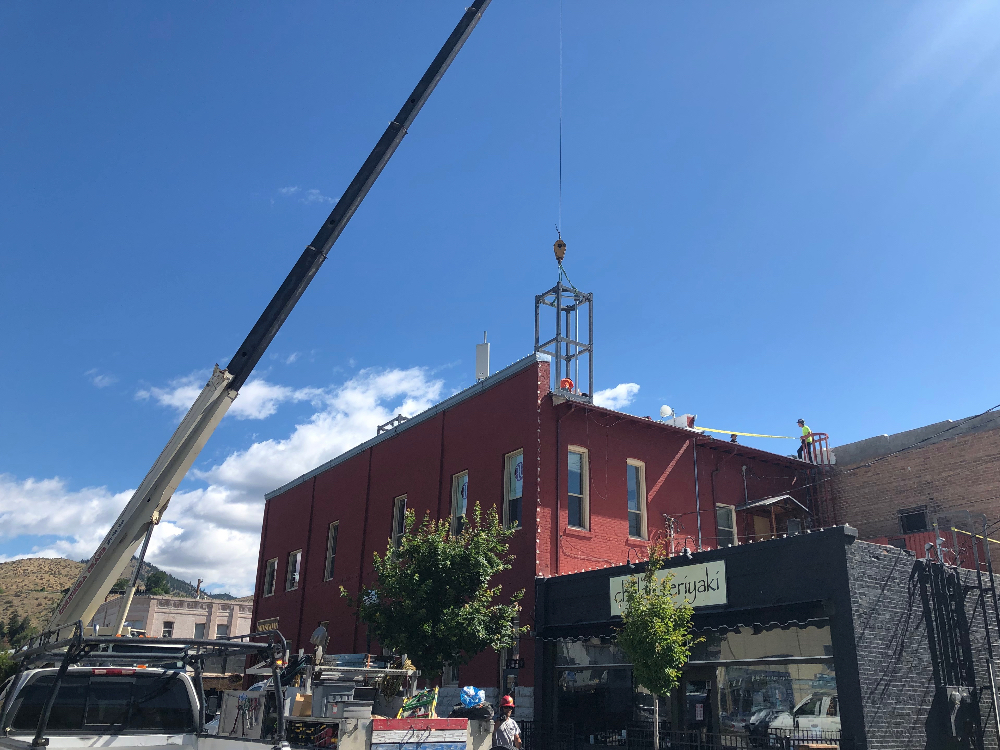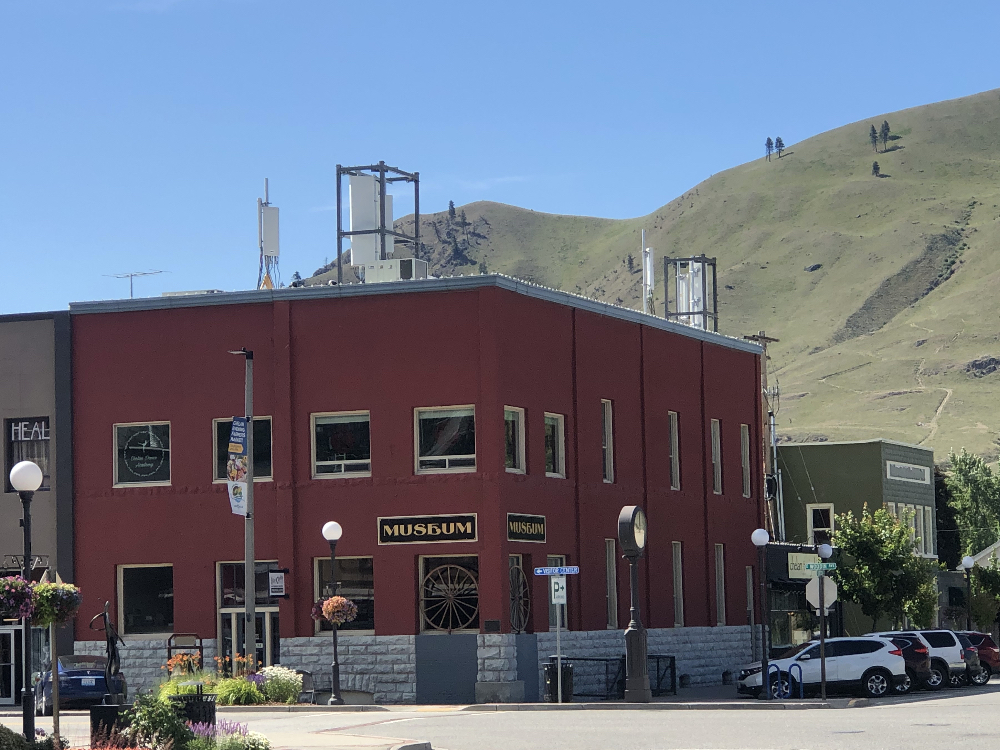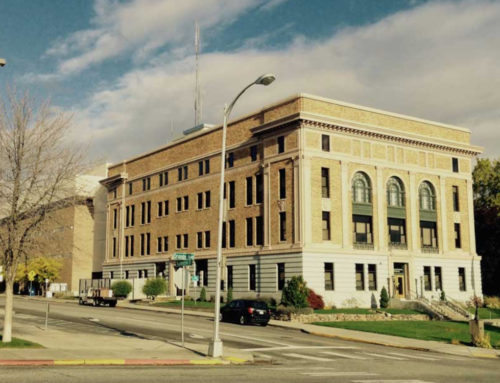T-Mobile preparing for 5G Cellular Services in Chelan
by Dennis Rahm
Earlier this week, Legacy Telecommunications started work on installing 5G capable towers atop the Chelan Museum in downtown Chelan. LakeChelanNow first reported on this via our social media channels on Wednesday and the news quickly spread and created a considerable amount of interest, concern and questions.
5G is the so-called fifth generation of cell-phone technology touting data speeds 50 to 100 times faster than 4G LTE networks. Verizon, AT&T and T-Mobile will all be offering the 5G service with rollouts occurring in some areas later this year and into 2020.
One of the Legacy installers of the equipment in Chelan confirmed to LCN the new towers are 5G capable and will be ready to go whenever T-Mobile launches their rollout in this area. He also pointed out that 5G capable towers are already in place on Chelan Butte.
LCN has attempted to contact T-Mobile via phone and email in hopes of getting a projected date that the service will become available in the Chelan area and additional details. So far we have received no specific information other than what is posted on their website indicating a late 2019 or 2020 rollout.
The news of 5G’s projected arrival in Chelan appears to have caught many by surprise. The response to the LCN Facebook posting yesterday has generated a number of views and opinions. Some look forward to enhanced connectivity, however many are voicing concerns about potential health hazards while others disapprove of the unsightly appearance of the towers on top of the museum.
The historic downtown building, which was originally built in 1907 as the Miners and Merchants Bank, is currently owned by the Lake Chelan Historical Society. Board member Don Lloyd confirms that T-Mobile has had a lease agreement for rooftop access to the museum for more than a decade.

Mayor Mike Cooney notes that the city council has had discussions about 5G cell towers in Chelan and said the general consensus was that they weren’t in favor of locating them in the downtown core. He notes however, that the technology is tightly regulated by the federal government, leaving the city without much of a say.
Last October, the FCC (Federal Communications Commission) restricted Cities’ abilities to regulate 5G infrastructure. This placed tight deadlines on local governments to approve or reject the installation of this new cellular equipment. It also placed limits on how much money a city can charge wireless firms for the privilege of putting hardware in public right-of-ways. The U.S. Conference of Mayors has gone on record to criticize the FCC’s move as a breach of local authority.
If you research the potential of health risks from 5G technology, you will find dozens of articles that claim there is a significant risk and yet dozens of others that debunk the idea of health concerns. Two of the articles we found are linked here: 5G can change the way we live for better or worse and 5G phones and your health: what you need to know.
We have also included links (below) to a story posted online by Lifewire that discusses the upcoming T-Mobile rollout of 5G. The article points out that their network will cover 96 percent of rural Americans. The article also notes that T-Mobile successfully performed their first low-band signal in Spokane in November of 2018. The second link refers to concerns raised by several cities regarding their lack of local control.
5G proponents promise much faster internet connections which will then also effect changes on the ways many things connect to the internet such as tv’s, cars and even connected lights on city streets. The first 5G phones have just recently hit the market and will continue to be released over time. The first 5G iPhone is expected sometime in 2020. Part of the 5G platform involves a $20.4 billion Rural Digital Opportunity fund to bring faster 5G networks to rural areas.
Additional Resources:
Cities prepare for 5-G amid worries about local control and tight timelines… read more.
Some T-Mobile users will have access to a mobile 5G network in 2019 when 5G phones are released. Lifewire reports that T-Mobile’s nationwide 5G coverage is coming in 2020. Unfortunately, the link is no longer working, but we have pasted the original story below.
T-Mobile customers can expect 5G access in the US this year, at least in a handful of locations.
The company will roll out mobile 5G in the second half of 2019, but is also developing a 5G broadband service so that you can get 5G’s ultrafast speeds at home, too.
T-Mobile 5G Cities
T-Mobile has 2020 as their target date for a nationwide 5G rollout, but they rolled out mobile 5G in 30 cities in 2018 to prepare for their 2019 launch.
- Dallas TX
- Las Vegas NV
- Los Angeles CA
- New York NY
T-Mobile 5G Plan Details
Given that the company has yet to release nationwide 5G, solid details aren’t available just yet about what the T-Mobile 5G plan will look like in terms of cost and features.
According to T-Mobile, by 2021, they plan to provide download speeds of at least 100 Mbps for nearly 2/3 of the US population, and eventually, users can expect 450 Mbps download speeds, and even higher (up to 4 Gbps) in the future.
T-Mobile plans to offer fixed broadband service (over 100 Mbps) to more than half the country’s households by 2024. This presumably hinges on whether they merge with Sprint to create New T-Mobile, but even without a merger, the company might still deliver on its plans.
In this FCC filing, T-Mobile estimates that over 20 percent of its fixed wireless access (FWA) subscribers will be located in rural areas where broadband is difficult to access.
A core promise of New T-Mobile is our commitment to bring real competition and real choice for in-home broadband to rural America.








